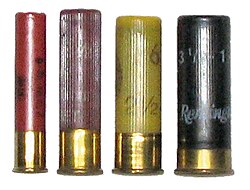20 gauge
| 20 gauge | |
|---|---|

|
|
| Type | shotgun |
| Place of origin |
|
| Production history | |
| Manufacturer | many |
| Variants | 2½", 2¾", 3" |
| Specifications | |
| Shoulder diameter | .673 in (17.1 mm) |
| Base diameter | .692 in (17.6 mm) |
| Rim diameter | .761 in (19.3 mm) |
| Rim thickness | .050 in (1.3 mm) |
| Case length | 2.270 (unfired, Federal ammo) |
| Primer type | centerfire |
The 20-gauge shotgun is a type of smooth-bore shotgun that fires a shell that is smaller in caliber (.615 in.) than a 12 gauge shotgun (.729 in.). It is often used by beginning shooters for target practice and for hunting small game.
It takes 20 lead balls of the diameter of a 20-gauge shotgun bore to equal one pound, while it only takes 12 lead balls of the diameter of a 12-gauge shotgun bore to equal the same weight. A 20-gauge shotgun is more suitable for hunting certain types of game, because it leaves meat intact, making it suitable for most game birds.
20-gauge shotguns are especially suitable for hunting game birds such as quail, grouse, turkey, and other small game when using shot shells. A 20-gauge can also shoot slugs and thereby become an effective deer-hunting gun. 20-gauge shotguns loaded with slugs are usually less accurate than rifles, but they often have better stopping power at short range—although this depends on the amount of gunpowder in the shell's load.
In addition, 20-gauge shotguns have less recoil than 10, 12 or 16-gauge versions on average, and may be more desirable to those who want to experience less recoil for prolonged shooting. The lower recoil also makes a 20-gauge appropriate for younger (or conversely, elderly) shooters who may have a difficult time firing a larger shotgun. However, recoil is largely dependent on the weight of the gun itself; for instance, a 4.5 pound 20-gauge can have more recoil than an eight-pound 12-gauge. This is widely considered a flaw in the design of so-called 'youth' guns.
...
Wikipedia
